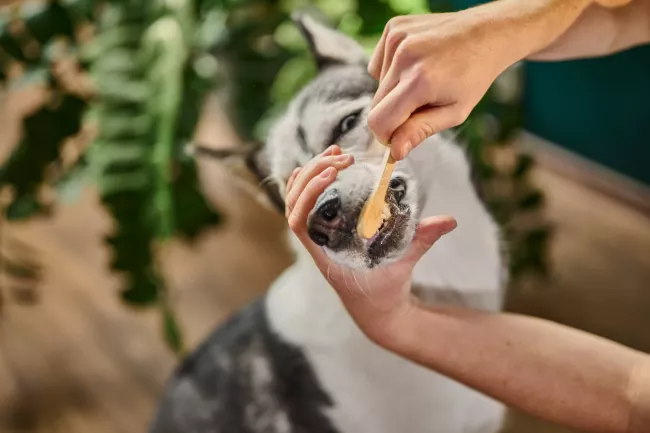Useful gift to your subscription
Get meat dog cookies from the famous bakery Dogtown with your first order for FREE! Become part of our Furnatura pack and receive practical advice, tips and great deals from the world of dogs
_1500x700.webp)
BLOG

Not all treats help clean dog teeth. In particular, beware of "buffalo hide" treats, which are first chemically preserved in the processing, then de-haired with toxic sodium sulfide, and finally cleaned with a peroxide solution to remove the typical odor. These treats are usually seasoned, dyed and finally glued with glue into attractive shapes.
Do you have a puppy at home and are hesitant about when and how to start brushing your dog's teeth? Is your furry friend's mouth starting to stink or has been for a while? Are you telling yourself that if he's eating well, he can't have a dental problem?
Even though it doesn't seem like it, without proper dental care, your dog's teeth can end up in a full anesthetic at the vet. A dog is a worry and caring for his teeth is part of that worry. With simple but regular care, you can achieve clean healthy teeth for your dog and avoid problems and vet bills.
How to care for your dog's teeth properly?
Dogs have a different pain threshold than us humans. Food is so important to them that they can go for years with tooth pain! So don't expect that because a dog eats well and doesn't "complain" about anything that it can't have a problem with its teeth. Prevention and frequent check-ups are therefore essential.
Plaque, tooth decay or even gingivitis is not only a threat to human teeth. In order to prevent these problems in dogs, it is necessary to learn how to care for dog teeth properly. Regular care of dog teeth will prevent dental diseases. And since dogs cannot brush their own teeth, this task is left to us, the owners.
Why is tartar in dogs dangerous? Tartar in a dog is caused by plaque build-up, which is a coating made up of saliva, food debris, bacteria, etc. The layer of plaque mineralizes, resulting in tartar.
Problems are mainly caused by bacteria that are found on the surface of the tartar - most commonly causing gingivitis in dogs and periodontitis, but in more advanced stages the inflammation can spread to the entire oral cavity. In most cases, the inflammation results in the teeth wobbling and falling out, which is very painful for the dog.
There are different brushes on the market that you can try and figure out what works best for you and your dog. Whether you use a specially designed dog toothbrush, a rubber finger brush, a baby toothbrush or just wrap your finger with gauze, it all counts!
If your dog likes to hunt for sticks, it's important to inspect his mouth after each walk to see if anything from nature has been left in there and is making mischief.
Natural toothpaste for dogs Furnatura can deal with plaque and dirt. Kaolin, which is the basic ingredient of the toothpaste, contains fine granules that gently clean your dog's teeth and restore the natural colour of the tooth enamel. The oral cavity is then naturally disinfected by coconut oil and turmeric. In addition, turmeric reliably removes all microbes and bacteria. It can also relieve inflammatory reactions as it rids the body of toxic substances thanks to its high antioxidant content.
